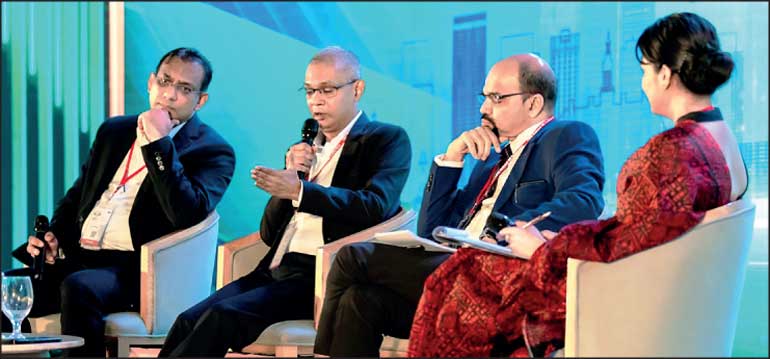Monday Feb 16, 2026
Monday Feb 16, 2026
Saturday, 28 June 2025 00:57 - - {{hitsCtrl.values.hits}}

From left: LOLC Holdings Director and LOLC Finance Chairman Conrad Dias, Dialog Axiata Group Chief Analytics and AI Officer Dr. Romesh Ranawana, Crompton Greaves Consumer Electricals Chief Human Resource Officer Prasanth Nair, Moderator – Fortude Chief People Officer Oshana Dias
The future of productivity is not just digital—it is decisively AI-driven. This was the resounding message from a panel of top industry leaders at the “Discover the Future of Productivity Through Digital Transformation” session, a cornerstone event of the International HR Conference organised by CIPM Sri Lanka on 3 June at the Monarch Imperial. The discussion, which delved into the complexities and opportunities of navigating digital transformation, brought together a formidable panel of experts. It featured LOLC Holdings Director and LOLC Finance Chairman Conrad Dias; Dialog Axiata Group Chief Analytics and AI Officer Dr. Romesh Ranawana; and Crompton Greaves Consumer Electricals Chief Human Resource Officer Prasanth Nair. The insightful session was expertly moderated by Fortude Chief People Officer Oshana Dias.
The digital imperative: No longer an option
Kicking off the discussion, Conrad Dias made a powerful case for the urgency of digital adoption. “Whether you’re a country or an organisation, digital is not optional anymore. It’s a national imperative,” he asserted. To underscore his point, he cited compelling data from the World Economic Forum, revealing that digitally mature organisations outperform their peers by a staggering 45% in revenue growth. However, Dias was quick to caution against a one-size-fits-all approach. “Transformation must be contextual,” he warned. “LOLC operates in sectors from finance to plantations to leisure—each with different levels of digital adoption. You have to understand your digital maturity first. Otherwise, you’re just ticking boxes.” He highlighted how even seemingly traditional sectors like plantations are reaping massive benefits from digitisation. “We’re the world’s largest tea producer under Browns. The next generation doesn’t want to work the way their parents did—so we need to bring technology to the field. Mechanisation, digitisation—it’s not just an option. It’s a must.” Dias also dismantled the pervasive myth of high implementation costs being a barrier. “Technology has been both democratised and demonetised,” he explained. “AI tools that once cost thousands of dollars are now available at $20 a month. If someone tells you capex is a barrier today, that’s outdated thinking.” He championed a “fail fast” culture, encouraging businesses to experiment, learn from their mistakes quickly, and pivot without fear.
The rise of the personal AI partner
Romesh Ranawana framed the current AI boom as the second great technological revolution in workplace productivity, comparable only to the personal computing wave of the late 20th century. “We’re entering a phase where every employee is expected to work with AI—not just use it as a tool, but to partner with it,” he said. Ranawana identified four key domains where AI is already making a measurable impact: Personal productivity: Assisting with everything from managing schedules to summarising complex reports. Work-specific tasks: Powering sophisticated functions like customer analytics and automated proposal generation. Team collaboration: Breaking down organisational silos and enhancing cross-departmental coordination. Enterprise efficiency: Optimising large-scale operations and enabling data-driven strategic decision-making. He offered a stark analogy to illustrate the challenge of adoption. “Imagine giving someone a $ 100,000 piano who doesn’t know how to play. That’s what many companies are doing with AI,” he cautioned. “The tool is powerful, but without training and the right culture, it’s underused—or misused.” Ranawana stressed that, just as they did with the rise of computers, HR professionals must once again lead the charge in fostering digital and AI literacy.
Beyond technology: The human layer of leadership
Prasanth Nair shifted the focus to the often-overlooked pillars of success: leadership and culture. “It’s the most studied area in organisational behaviour, and yet the number one reason cited for failed transformation is still leadership,” he stated. Drawing a compelling parallel with the world of sports, Nair pointed to the recent success of the French football club PSG. “For years, they had a team of stars but failed to win the Champions League. This year, they succeeded. It reinforces the point: a team of stars is not the same as a star team. In business, culture and connectedness matter more than individual brilliance.” Nair also issued a profound warning against viewing AI as a passive tool. He compared its unchecked power to the mythical figure Bhasmasura, who was granted the power to turn anyone to ash and inadvertently destroyed himself. “AI is an agent—it can produce outcomes its creators may not even anticipate,” he urged, highlighting the need for strong governance. To guide HR leaders, Nair proposed a three-part model for building a future-ready organisation, encapsulated by the acronym “AIE”: Anti-fragile culture: Moving beyond mere resilience to building organisations that thrive and grow stronger through adversity. Innovation at scale: Weaving innovation deep into every layer of the organisation, making it a universal responsibility. Energy: Cultivating and maintaining momentum through a positive, purpose-driven, and engaging workplace. “Think of AIE,” he concluded, “as Artificial Intelligence for Employees—a balanced, human-centric approach to AI adoption.”
A human-powered, tech-driven future
While technology possesses immense transformative potential, it cannot replace the essential human elements of strategic decision-making, empathy, and visionary leadership. As moderator Oshana Dias eloquently summarised, “The future of productivity is not just digital—it’s deeply human, powered by technology but steered by people.” A live poll conducted during the session revealed that the majority of attendees see digital transformation in their organisations as “in progress.” This, panellists agreed, was encouraging—but also a signal that transformation is not a one-time event. It is a continuous journey requiring agility, cross-functional collaboration, and a redefinition of leadership. Moderator Oshana Dias wrapped up the session on an optimistic note, highlighting that while technology may set the pace, people will always set the direction. The takeaway was clear: productivity in the digital age is not just about machines—it’s about mind-set, methods, and above all, meaning.